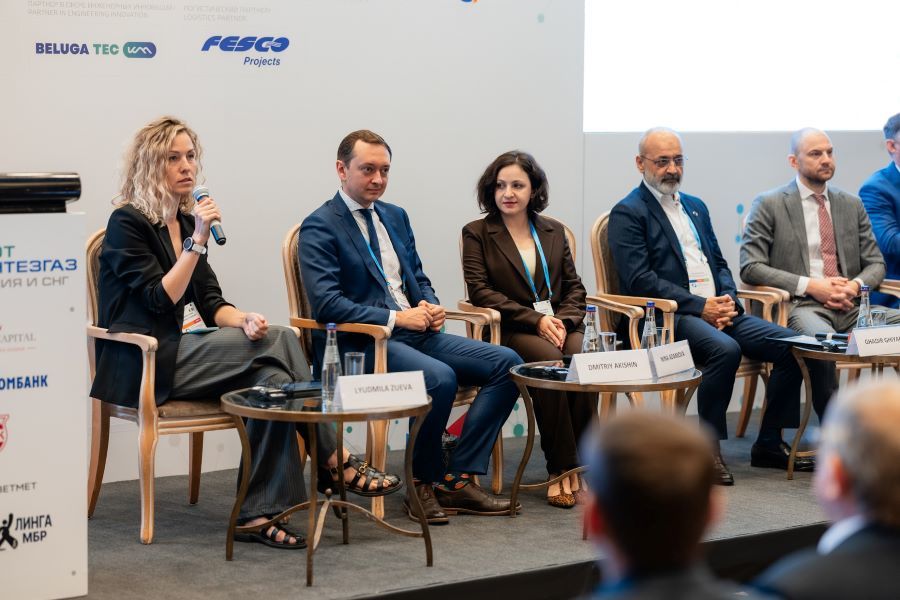Post-crisis Gas Chemistry and its Prospects

The delegation of Metafrax Chemicals took part in the annual congress and exhibition "Syngas Nitrogen Russia and CIS". Top managers of the company held several working sessions, and also discussed with colleagues of the leading enterprises the most promising projects for the construction and modernization of production.
The largest enterprises producing nitrogen, methanol, ammonia and mineral fertilizers (nitrogen, potash, phosphorus, compound ones) from Russia and the CIS countries met in Moscow on May 22-23 with representatives of government, regulatory and supervisory authorities, licensors of production technologies, developers, manufacturers and suppliers of equipment, engineering and design and construction companies, suppliers of technologies and services.
Metafrax Chemicals was represented at the congress by Ivan Feoktistov, Director of Strategy, Andrei Yeremeyev, Technical Director, Yevgeny Gavrilov and Lyudmila Zuyeva, heads of the Strategy Project Office, and Karolina Leshchinskaya, strategy analyst.
The main topic of discussion: promising directions for overcoming the crisis and post-crisis recovery. At the first section "Transforming past challenges into useful experience: overcoming the crisis for the development of the industry and enterprises within it", moderated by Lyudmila Zuyeva, the participants comprehensively discussed the current state of gas chemistry in Russia and the world, in particular, the specifics of the methanol, ammonia and urea supply. It was noted that possible comprehensive solutions in the industry could offset the risks of individual products and stimulate the creation of projects at potential points of industry growth. Separately, experts emphasized the growing influence of climate regulation on the further industry development.
At the session "Capacity development and strengthening despite all obstacles: projects for the construction and modernization of enterprises in the industry", Yevgeny Gavrilov participated as a panel member. One of the reports gave a comparative cost estimation for delivery methods of hydrogen as a fuel source. The best indicators were demonstrated by methanol and ammonia. Yevgeny Gavrilov developed the topic of alternative fuels, mentioning the environmental and economic benefits of using methanol.
The fourth session "Plans VS Opportunities: cargo transshipment" brought together experts in project logistics, including port infrastructure and terminal construction. Speaking as a moderator in the discussion, Yevgeny Gavrilov discussed with the session participants legal possibilities and restrictions for carriers, possibilities of existing infrastructure and transport capacities, the potential for the development of new transport corridors. Questions were also raised about the transshipment of chemical cargoes, the management of cargo terminals, and the impact of sanctions on trade relations with Asian countries.
The session "Greening the industry: government regulation measures, environmental protection, decarbonization strategies" touched upon the implementation of the ESG agenda by companies as part of measures to reduce the carbon footprint from anthropogenic impact. The use of alternative fuels was proposed as a possible solution to decarbonize activities, in particular, emphasis was placed on possible prospects for the use of methanol and ammonia in water transport. During the discussion, representatives of Metafrax Chemicals Lyudmila Zuyeva and Karolina Leshchinskaya raised the issue of existing refueling technologies and the readiness of Russian ports in general to develop infrastructure for bunkering vessels with methanol. The subject of the discussion sparked a lively response from the audience.
Karolina Leshchinskaya: “The environmental friendliness of methanol as a fuel has already been confirmed by numerous studies, and methanol vessels occupy a significant share in the portfolio of new orders from shipbuilding companies in recent years. The prospects for the construction of methanol-powered vessels in Russia haven’t yet been clearly defined, but the industry is paying special attention to conducting research and development in this direction.”
Ivan Feoktistov commented on the congress results:
“We’d like to note the positive dynamics in the topics discussed this year. The inertia of overcoming, which drove companies during the acute phase of the crisis, is now moving into the post-crisis period, where the industry forms more ambitious requests and projects of participants in the gas chemical industry.”